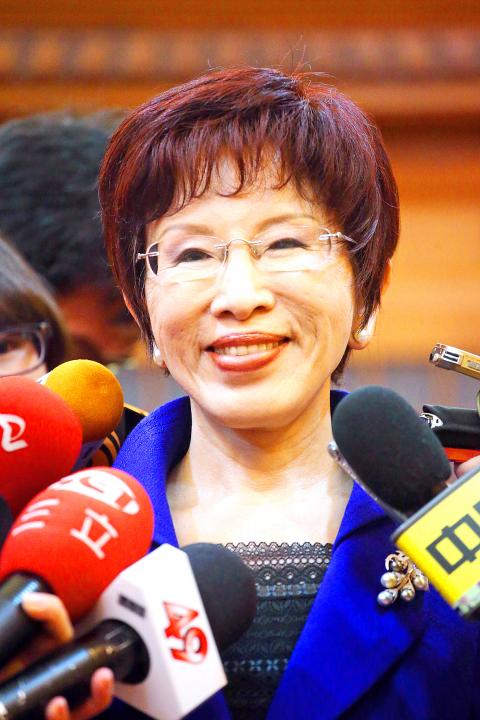Deputy Legislative Speaker Hung Hsiu-chu (洪秀柱) yesterday emerged as the only candidate qualified to run in the Chinese Nationalist Party’s (KMT) presidential primary after obtaining the necessary number of signatures from KMT members.
A screening committee announced that Hung had obtained 35,210 valid endorsements from registered members, surpassing the 15,000 threshold.
Former Department of Health minister Yaung Chih-liang (楊志良), the only other person to file registration papers, obtained only 5,234 valid signatures, failing to meet the requirement, the committee said.

Photo: CNA
Hung had submitted more than 60,000 signatures and Yaung more than 30,000, but many of them were disqualified for various reasons, the committee said.
According to the KMT’s primary regulations, Hung must next face a public opinion poll, and would be required to garner the support of at least 30 percent of respondents.
The KMT has yet to decide how to conduct the poll, but one of the likely options is to ask respondents to choose between Hung and Democratic Progressive Party Chairperson Tsai Ing-wen (蔡英文).
Should Hung fall short of the 30 percent threshold, the party might opt to draft another candidate to run.
While KMT Nomination and Review Committee convener Hau Lung-bin (郝龍斌) said the method and timing of the poll required further discussion, Hung urged the party to hurry, as the earlier the KMT knows in which direction it is heading, the more time it has to prepare its candidate.
Hung said that she believed she would ultimately be the party’s choice, adding that she would “take the responsibility, work hard and win [the election.]”
Meanwhile, Yaung announced that he was dropping his bid.
He said he wished Hung the best and hoped she exceeded the 30 percent threshold, adding that he would not consider running for a legislator or legislator-at-large post in the January elections.
In response to concern that the KMT would lack a strong vice presidential candidate, KMT Chairman Eric Chu (朱立倫) said that the party’s core interests were the same as Yaung’s — “distributive justice” — adding that the party’s nomination would adhere to its internal policies.
The only KMT members who appear to be somewhat competitive with Tsai in opinion polls — Chu and Legislative Speaker Wang Jin-pyng (王金平) — have said they would not enter the presidential race.
The KMT is the underdog heading into the January elections, hurt by its disastrous showing in the nine-in-one elections on Nov. 29 last year and the dismal approval ratings for President Ma Ying-jeou’s (馬英九) administration, which have dropped to about 20 percent.
Additional reporting by Lee Ya-wen and Chiu Yen-ling

‘ABUSE OF POWER’: Lee Chun-yi allegedly used a Control Yuan vehicle to transport his dog to a pet grooming salon and take his wife to restaurants, media reports said Control Yuan Secretary-General Lee Chun-yi (李俊俋) resigned on Sunday night, admitting that he had misused a government vehicle, as reported by the media. Control Yuan Vice President Lee Hung-chun (李鴻鈞) yesterday apologized to the public over the issue. The watchdog body would follow up on similar accusations made by the Chinese Nationalist Party (KMT) and would investigate the alleged misuse of government vehicles by three other Control Yuan members: Su Li-chiung (蘇麗瓊), Lin Yu-jung (林郁容) and Wang Jung-chang (王榮璋), Lee Hung-chun said. Lee Chun-yi in a statement apologized for using a Control Yuan vehicle to transport his dog to a

Taiwan yesterday denied Chinese allegations that its military was behind a cyberattack on a technology company in Guangzhou, after city authorities issued warrants for 20 suspects. The Guangzhou Municipal Public Security Bureau earlier yesterday issued warrants for 20 people it identified as members of the Information, Communications and Electronic Force Command (ICEFCOM). The bureau alleged they were behind a May 20 cyberattack targeting the backend system of a self-service facility at the company. “ICEFCOM, under Taiwan’s ruling Democratic Progressive Party, directed the illegal attack,” the warrant says. The bureau placed a bounty of 10,000 yuan (US$1,392) on each of the 20 people named in

The High Court yesterday found a New Taipei City woman guilty of charges related to helping Beijing secure surrender agreements from military service members. Lee Huei-hsin (李慧馨) was sentenced to six years and eight months in prison for breaching the National Security Act (國家安全法), making illegal compacts with government employees and bribery, the court said. The verdict is final. Lee, the manager of a temple in the city’s Lujhou District (蘆洲), was accused of arranging for eight service members to make surrender pledges to the Chinese People’s Liberation Army in exchange for money, the court said. The pledges, which required them to provide identification

INDO-PACIFIC REGION: Royal Navy ships exercise the right of freedom of navigation, including in the Taiwan Strait and South China Sea, the UK’s Tony Radakin told a summit Freedom of navigation in the Indo-Pacific region is as important as it is in the English Channel, British Chief of the Defence Staff Admiral Tony Radakin said at a summit in Singapore on Saturday. The remark came as the British Royal Navy’s flagship aircraft carrier, the HMS Prince of Wales, is on an eight-month deployment to the Indo-Pacific region as head of an international carrier strike group. “Upholding the UN Convention on the Law of the Sea, and with it, the principles of the freedom of navigation, in this part of the world matters to us just as it matters in the